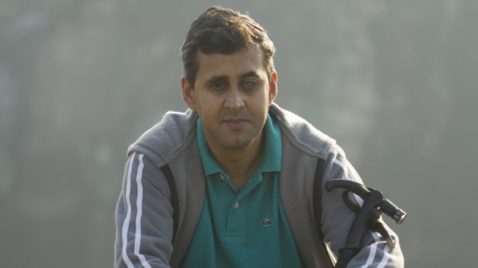
Dr. Divyanshu Ganatra is a psychologist, entrepreneur, para-glider, mountaineer, IT expert, and literary geek who also happens to be blind. Divyanshu lost his eyesight to glaucoma at the age of 19 and soon realized that the world was ready to put him into silos and stereotype him forever. He decided to break the stereotypes and myths around disability using adventure sports and founded Adventures Beyond Barriers, a not-for-profit organisation which organises adventure sports events with the able-bodied and disabled community together. Divyanshu is a self-motivated, enthusiast, endowed with an insatiable thirst for learning.
Describe yourself in one word. What’s your biggest strength and biggest weakness?
Hippie, I feel like the last hippie standing. My biggest strength is that I thrive on challenges and my biggest weakness is that I am very talkative and persistent. I am also stubborn and sometimes it gets in the way. It is a good and a bad thing.
How have your views evolved/changed on disability before and after your disability happened?
Interestingly, I had no views on disability before I went blind. I didn’t know a single person with disability, I just knew they existed in a parallel universe and the little I knew was from the media so there wasn’t much. The day I went blind I became the first person I knew who was blind. I didn’t have any friends and I didn’t know anybody else who was blind. When I went for rehab, I realized that I was in this world now. That’s when I realized that, “Oh my God, there are millions of them and they are all coming out of the woodwork!”. I thought to myself, how is it that I have never known anybody with a disability for the first 18-19 years of my life? Today, I probably know more people with disabilities than without.
Since there was no “before and after”, there was only a now. There was no reason for me to change my perspective on disability, in that I didn’t have one before. I didn’t care enough, I didn’t know, there was no contact, nothing. If there are millions of people with disabilities, why is it that I do not have any friends with disabilities? Why is it that I never went to school with someone who has a disability? Why is it that I don’t see them in restaurants? Why is it that I don’t see them at the cinemas? Why is it that I don’t see them at the workplace? Why don’t my colleagues present any disabilities? These are the fundamental questions. Almost 22% of the Indian population is disabled, which means that almost one in every four or five has a disability. We are the largest minority community in the world.
Where there is a disability, there is a shame and stigma associated. People with disabilities are locked indoors because their parents don’t want to introduce them to the world. So you have a whole bunch of people locked indoors. Then there are a whole bunch of people who are locked indoors simply because of lack of access to infrastructure. If I am a wheelchair user and there is a flight of stairs and no lift in my building, I am stuck indoors. Even if my building was accessible, there are places where I have to go that are not. So, there goes a whole bunch of the population. They are locked indoors. And the rest of them who are outside, go to special schools. And the only time when the mainstream community come to those schools are during school day trips. But all the “normal students” are brought to a blind school to spend the day to see how blind students live, like monkeys in a zoo. And nothing really changes. In fact, the image that these “normal children” take back is that of sympathy.
When there is no contact, how do you build empathy? That’s the fundamental problem. When you don’t feel empathy, that breeds stereotypes and perpetuates stereotypes. Being a person with a disability, my disability is not my problem at all. It’s never been my problem. The attitudinal barriers we face daily are the biggest challenges. And it is these social attitudinal barriers that need to change, that need to be shattered, that need to go away and they can only go away through empathy and contact. That’s the fundamental issue with disability in India.
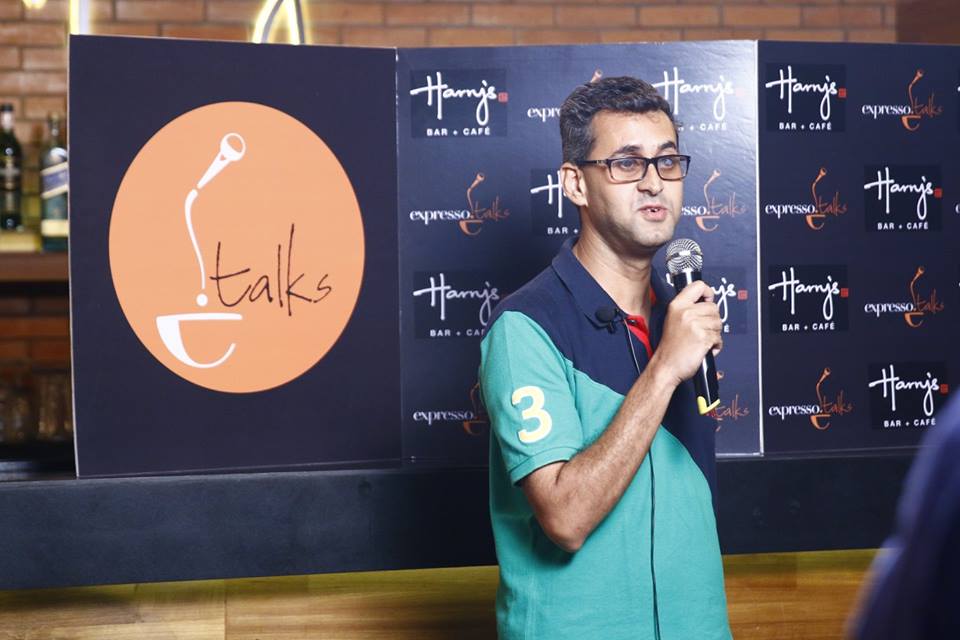
Divyanshu giving a talk
Apart from the physical challenges of being blind you also face attitudinal disability. How can we address this in our society? Please share examples of what you have faced and how people could have reacted differently.
I have an impeccable resume, but it’s no good! Because 80% of my contracts get cancelled the minute they find out I’m blind. No matter how hard I’ve worked, no matter how good I am, how deserving I am, the fact that I can do this better than 100 other people doesn’t make a difference. They simply will take someone “normal” because there is no risk according to them. And because they are awkward around disability. People are awkward. They don’t know how to have a dialogue with a disabled person. They will say, “yeah yeah yeah, excellent we will let you know.” but they won’t bring up the questions in their head such as, “You’re blind, how are you going to use a computer? We don’t know, can you tell us? Can you tell us how you’re going to do this because we just don’t know?” But they are awkward and then they don’t want to have this dialogue, because they assume, “Oh my god he’s blind! He can’t use a computer.” And that’s what they know. This is just an example. They never even think of asking if I can do this or, “You’ve mentioned on your resume that this is what you’ve done, how did you do it?” They never ask.
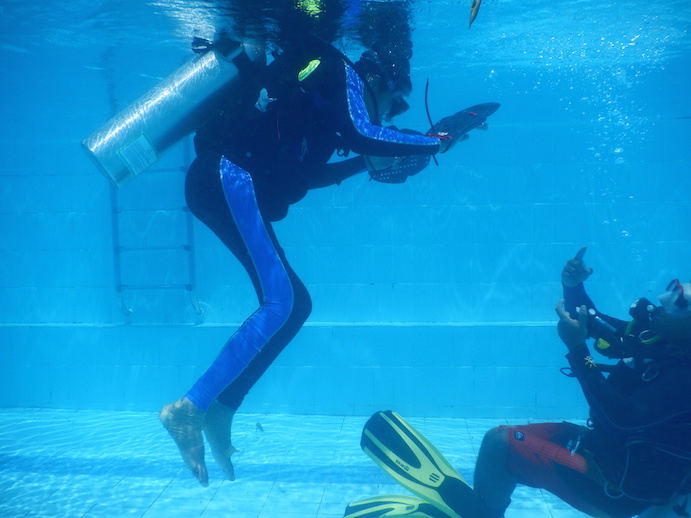
Divyanshu Scubadiving
One type of attitudinal barrier is that all persons with disability are considered to be asexual. As if we are divine people with no need to be evolved. But that’s not how we feel. People freak out if we say, “I have the same needs as you.” So to be considered asexual is a major deal for the disability community.
Then take leisure and sports where people think, “You’re blind, you can’t climb a mountain. You’re quadriplegic, you can’t scuba dive. You can’t do this. You can’t fly. You can’t. You can’t. You can’t.” Nobody asks, “Where is the evidence that I can’t? You create an equal space and I will show you how I can.” So these are the kind of challenges that are faced on an everyday basis. Where you are passed on for somebody else. Where you are not given equal opportunities. Where you are denied education. Where you are denied a job. Where you are denied a relationship. Everyday! Either you are treated like a pet or a pot.
Either you are put up on a pedestal, where you are inspirational; and I abhor that word “inspirational”. When somebody doesn’t know anything about me, and they just look at me and say, “Oh my god, you’re blind. You’re so inspirational.” I think, “What did I do?” And then they want to put me on a poster like an inspirational pawn. They want to put my photo on a poster and say, “The only disability is a bad attitude.” That’s an inspirational pawn. You are objectifying me! It is no different to how you objectify women. It is exactly like that. I feel objectified. It is very hard for people to understand the idea of how one would feel objectified if the world is looking up to you. I don’t want you to look up to me. I want you to look at me as an equal. Because when you put me on a pedestal you take away my human right to make a mistake. So then I can’t make a mistake because you put me up there, lonely at the top or you treat me with dignity and sympathy. But you don’t treat me as an equal. And that is what happens every day. I’m not inspirational for getting out of bed. There is nothing inspirational about getting out of bed. There is nothing inspirational about eating food.
Eventually, having a disability, it is the same for anyone. We all have our own ways of doing it. We all have our areas in which it is easy for us. We all have our own areas where we face a challenge. It is just different for everybody. So we all do things differently and so do I. So you look at the toothbrush when you are putting toothpaste on it. I feel the toothbrush when I am putting toothpaste on it and sometimes it works better for me because I can do it half asleep. I am doing the same thing, just slightly differently, there’s nothing to think about. It’s really no big deal. The only big deal is that you close your eyes temporarily and then you imagine yourself doing this these and think it’s impossible. But you’ve only given yourself a minute so yes, it is impossible in a minute. Give yourself time. And trust me, you will want to go blind.
It is beautiful to be blind because I can imagine possibilities. I am not limited by what I see; I can imagine possibilities. I can create the world I want. I can create the world the way I want. I can turn the ugliest person into the most beautiful person. I don’t see this as dark and dull, it’s my life. It’s full of vivid colours and visuals and all kinds of things. When I was told I was becoming blind, I closed my eyes and tried it out in my room. The one thing I knew was that I always had a choice to open my eyes and see. So it never hits you completely. It doesn’t sink in until the day you keep your eyes open and you can’t see. That’s when blindness really really hits you. That when you know what blind really is. Blind is not having the ability to open your eyes and see. So I do things slightly differently, but there is no major difference. Just a slight difference. You could do the same. Being blind is the most beautiful gift ever. I didn’t think so 18 years ago but today I know it is the most beautiful gift. It’s tough, and I live with it but who said life was going to be a rose park.
How do you convey these concepts now to somebody who has always been blind? How do you help them?
That’s a very tricky issue. I will give you an example. The way I see and experience the world now, is mostly through touch. Touch in our country is a taboo. You can stare all you want but you can’t touch. So for me I have a big problem where staring is okay but touching is not. Touch is a huge taboo. Given that, imagine a scenario, which is a reality. You’re 23 years old, you’re born blind and you get married. And you have never ever seen what the opposite sex looks like, and that night is the first night where you get to experience the opposite sex. All you can hear is screams, non-joyous screams. It is traumatic. This is a grown-up knowing that this is my body image and this is how people are. And then you experience something so drastically different from me. My brain is not ready for it. That’s the level to which things are.
So the way I can help a blind person experience the world is through tactile, to give miniature tactile objects to get them to touch and feel things as much as possible. That’s how I create the world in my head. But that is solely lacking in India. There are so many museums in the world where I can touch objects and the tactile things. It’s a beautiful experience. It’s so immersive, it’s so inclusive, it’s so amazing. In India you can’t do this. I get run out of a shop if I touch a mannequin. I get really weird looks and I get this even when I am blind. People don’t know how to react and they are nervous. They see a blind guy touching things and they think, “What are you doing? Why are you touching everything?” They freak out. India has a long way to go.
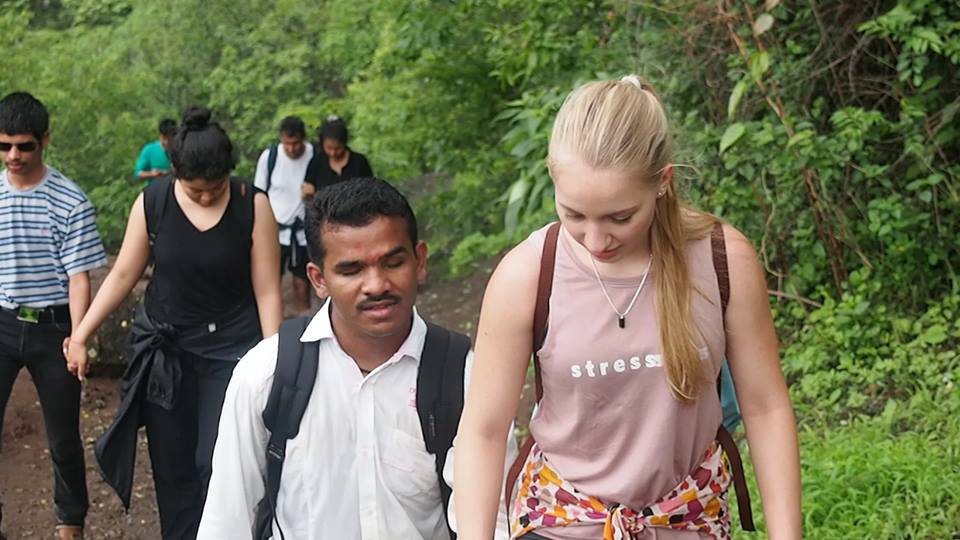
On a Trek
Adventures Beyond Barriers is..?
It’s a nonprofit foundation where we promote adventure sports to persons with disabilities and able-bodied people together. We mostly do adventure and outdoor sports. We have 5 verticals such as dirt tracks and lawn tracks, we do mountain tracking and camping, scuba diving, tandem cycling and paragliding. We work with cross disability to ensure that everybody has equal access and takes part in the sport as an equal and everybody does it together. There is nobody who is less or more, you do it as a team and everybody finishes the same goal. Whatever adaptations need to be made, we’ll make those but we ensure higher safety standards. Eventually, the main purpose is getting these two communities to come out and play together. Our belief is that when you play together, you forget your differences and discover so much about each other, much more than when you are just having a conversation.
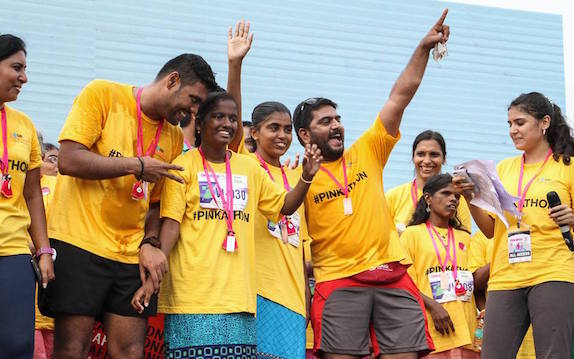
Pinkathon marathon participants
Sports is something I know best and sports is something that is true to my heart. When I look back, as students when we played we never made any differentiation between a thin boy, thin girl, fat, brown, rich, poor, anything. We were all friends and we all played together. If somebody couldn’t, we made sure that they were included. That is the power of sports. It unites people, it gives a lot of hope, it inspires. It’s amazing. Sports is just a tool to get these two communities to come and interact and play together and shatter the stereotypes that is held in each other’s heads. For example, a lot of disabled communities say, “I can’t climb mountains. I’ve been told I can’t climb mountains and I can’t scuba dive. I am quadriplegic I can’t move anything under my neck. I’ve been told I can’t do this.” And I say, “Let’s see.” They do it and it’s just amazing! It’s in the experience, the joy it derives when I see them do something that they never ever thought they would ever be able to do in their lives. Sometimes they think they can’t do it because the world has told them so.
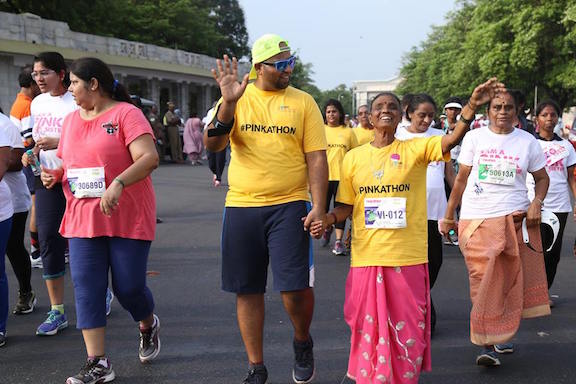
During one of our marathons
For people who want to help, donating (writing a cheque) is the easiest thing to do. Before you write that cheque, we want you to first come and experience. Don’t just write a cheque. We want that money and I am not saying that we don’t want your cheque. Right now we do need that money because otherwise we are going to have to shut down. But when you experience it, then you can also tell us, “I can do these four other things. Just giving you a cheque is a bad idea. I am a retired CEO and I have management skills, I can contribute my time. I can help you scale up.” Or, “I am head of marketing, and I can help your organization with advertising and branding.” There are a million ways in which you can help. Once you experience it, you know how you can help. We have often had this experience, people have said, “You know what, this would have ended with a Rs10,000 cheque but now this is like a family and I can contribute in so many other ways using my skills.”.
You are constantly breaking barriers. What drives you and why?
I absolutely love what I do. I end up doing things like that because I’m passionate love the outdoors and I love my work. I don’t do it for breaking a record. I really don’t have to prove anything to anybody. I do it because I simply love doing it. I love to challenge myself and push myself a little more each time. It’s my determination or stubbornness that tells me I can do this. I get really riled up if someone says I can’t do something. Let me decide that. In the process you just push yourself and you realize you always had it within.
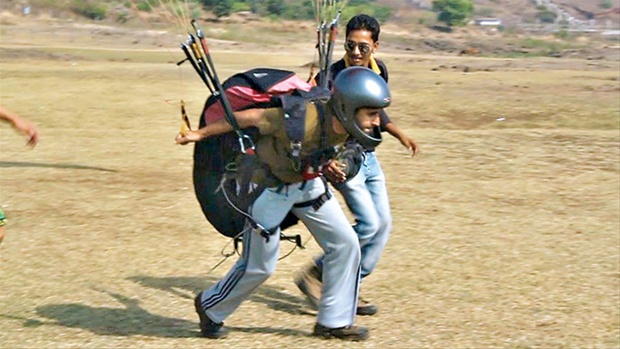
Divyanshu taking off during his first solo paragliding
Divyanshu Ganatra- Psychologist. Entrepreneur. Para-glider. Mountaineer. IT Expert. Literary Geek. Passionate Soul, Drummer, Licensed Pilot, Also, Blind. What’s next for you personally and professionally?
A big one is the Manali to Khardung La bike ride, there are going to be many challenges and it is one of the toughest cycling routes. You do it in tandem, you can’t stand and pedal. You are completely sitting all the way so you have to deal with a lot of sore leg muscles, high altitudes, all kinds of things. There is very high risk there. That’s my next big challenge and focus. I have a crew and another organization called Run Buddies who will give their support. My captain Gagan Grover and I practice together. He has been a pro cyclist and is a great person to have on the team. You can support our upcoming bike ride through our crowdfunding campaign: https://www.fueladream.com/home/campaign/325
We also have a marathon coming up with quite a few disabled people participating. So we are working towards that.
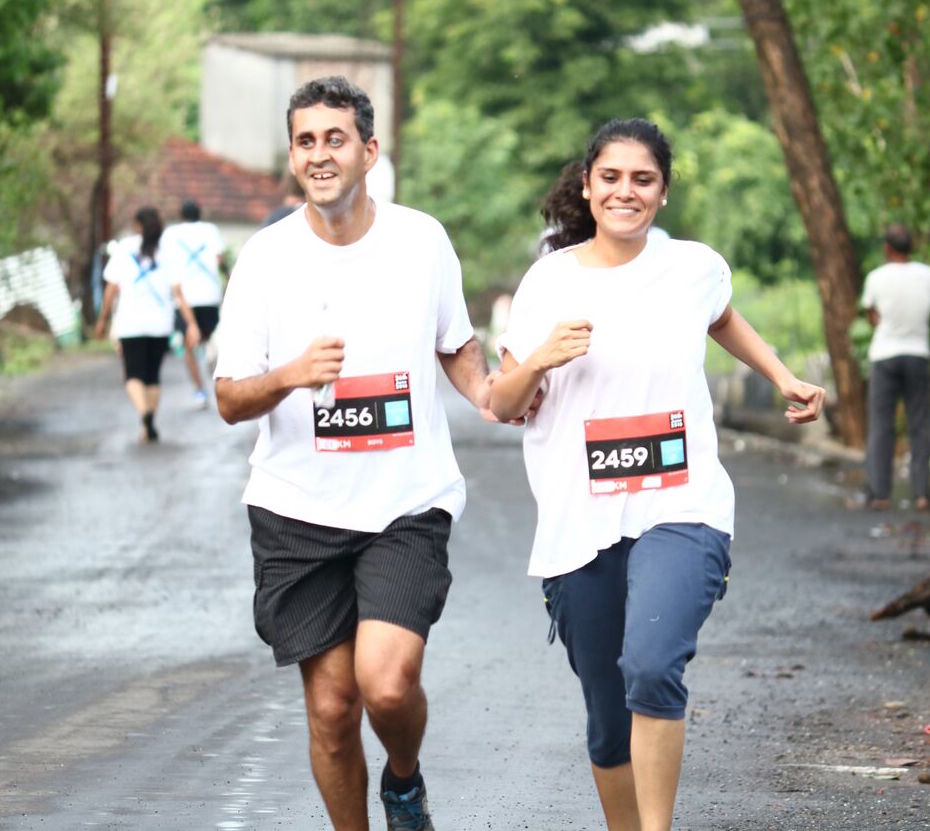
Run buddies
What would you tell your 14 year old self?
I don’t know. I just believe one step at a time and I believe I can. I believe this world is a good place and we can make it better. I can do my bit, I really believe I can make it a little bit better for many of those who are not as privileged as I am. Just a bit of empathy is all we need. I still think there is hope for this planet but we running out of time. There is so much to do. There are so many mountains to climb. So you have got to do what you have got to do. I thank my family for being so kind and patient with me.
Sayfty’s mission is to educate, equip and empower women to protect her against violence. What’s your message for our readers related to women’s personal safety and the issue of violence against women?
Err on the side of caution. It doesn’t hurt to be safe. Occupy spaces, loiter. That makes spaces more safe. Have a dialogue with the opposite gender. Focus on your boys and fill them with empathy. Don’t differentiate between your girl and boy child. That’s how the boys learn. There are many things but I think just occupying space. That just changes everything.
Bio
Divyanshu’s Bio is available on: https://in.linkedin.com/in/divyanshuganatra
Images copyright © Divyanshu Ganatra